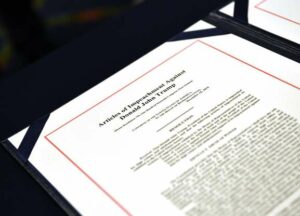The Senate trial of Donald John Trump has produced many disappointments for me, but one of them stands front and center as the Senate fast-tracks this trial toward a probable acquittal for the current president of the United States.
It is the way senators appear ready to surrender their constitutional duty of oversight of the executive branch.
The House of Representatives impeached Trump on two counts, abuse of power and obstruction of Congress. It’s the obstruction article that has baffled me.
Congress sought to subpoena key White House aides to testify during its impeachment inquiry. The Constitution gives the legislative — and “co-equal” — branch of government the authority to do so. Trump’s response? He said “no.” He barred aides from answering the summons. He told Congress, in effect, you cannot — and I will forbid it — perform your duty of oversight.
What is stunning to me is how the Senate majority appears set to roll over on that one. By voting to acquit Trump on the obstruction allegation, senators will concede that it’s all right for the government’s chief executive to stiff the legislative branch, to tell legislators to take a hike.
I won’t engage in the “both sides” argument, presuming what the response would be if a Democratic president would do the same thing. History tells us that Trump is the first president in history to issue blanket orders to obstruct Congress in this shameful manner. President Clinton didn’t do so when the House was inquiring whether to impeach him; nor did President Nixon.
Donald Trump’s dismissal of congressional oversight is frightening on its face. Even more terrifying is the GOP’s willingness to accept it, to say it’s OK for the president to kick Congress in the teeth.
